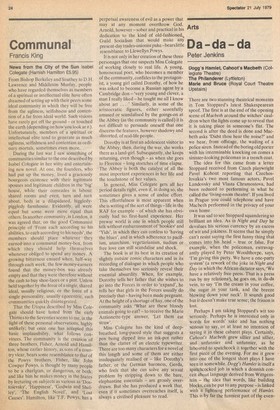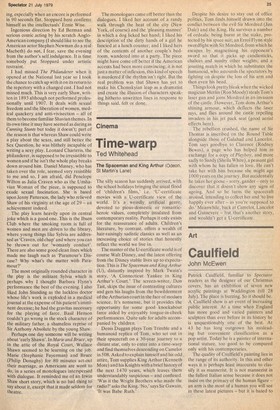Dogg's Hamlet, Cahoots Macbeth (Collegiate Theatre) The Philanderer (Lyttleton) Made
and Bruce (Royal Court Theatre Upstairs) There are two stunning theatrical moments in Tom Stoppard's latest Shakespearean spoof. The first is at the end ofthe opening scene of Macbeth around the witches' cauldron when the lights come up to reveal that it is taking place in someone's flat. The second is after the deed is done and Macbeth asks Didst thou hear the noise?' and we hear, from offstage, the wailing of a police siren. Instead of the boring old porter with his interminable knocking on comes a sinister-looking policeman in a trench coat.
The idea for this came from a letter Stoppard received from Czech playwright Pavel Kohout reporting that Czechoslovakia's two most famous actors, Pavel Landovsky and Vlasta Chramostova, had been reduced to performing in what he called the `living-room theatre'. If you lived in Prague you could telephone and have Macbeth performed in the privacy of your own home.
It was sad to see Stoppard squandering so brilliant an idea. As in Night and Day he devalues his serious currency by an excess of wit and jokiness. It seems that he simply can't resist saying the first funny thing that comes into his head — true or false. For example, when the policeman, extravagantly played by Peter Woodthorpe, says, 'I'm giving this party. We have a one-party system' (a rework of the joke in Night and Day in which the African dictator says, 'We have a relatively free press. That is a press run by my relations'), he goes on, in da-da vein, to say `I'm the cream in your coffee, the sugar in your tank, and the breeze blowing down your neck'. It sounds good but it doesn't make true sense; the frisson is lost.
Perhaps I am taking Stoppard's wit too seriously. Perhaps he is interested only in words for words' sake and has nothing serious to say, or at least no intention of saying it in these cabaret plays. Certainly, C'ahoot's Macbeth grew sillier and sillier, and unfunnier and unfunnier, as he laboured to spatchcock it together with the first piece of the evening. For me it grew into one of the longest short plays I have seen in somewhile. Dogg's Hamlet is itself a spatchcocked job in which a donnish conceit about language derived from Wittgenstein — the idea that words, like building blocks, can be put to any purpose —is linked with a lightning performance of Hamlet. This is by far the funniest part of thip even ing, especially when an encore is performed in 90 seconds flat. Stoppard here confirms himself as the intellectuals' Ernie Wise.
Ingenious direction by Ed Berman and serious comic acting by his scratch AngloAmerican company (I should like to see the American actor Stephen Newman do a real Macbeth) do not, I fear, save the evening from the author's self indulgence. It is time somebody put Stoppard under artistic restraint.
I had missed The Philanderer when it opened at the National last year so I took the chance to catch up with it on its return to the repertory with a changed cast. I had not missed much. This is very early Shaw, written in 1893 although not performed professionally until 1907. It deals with sexual freedom and the liberation of women, medical quackery and anti-vivisection — all of them to become familiar Shavian themes. In its own time it may have seemed as daring as Cunning Stunts but today it doesn't; part of the reason is that whereas Shaw could write a play about the sexes, and still better the Sex Question, he was blithely incapable of writing a sexy play. Leonard Charteris, the philanderer, is supposed to be irresistible to women and if he isn't the whole play breaks down around him. Daniel Massey, who has taken over the role, seemed very resistible to me and so, I am afraid, did Penelope Wilton as Julia Craven who as the Unshavian Woman of the piece, is supposed to exude sexual fascination. She is based upon Jenny Patterson, the lady who relieved Shaw of his virginity at the age of 29 — an achievement indeed.
The play leans heavily upon its central joke which is a good one. This is the Ibsen Club where the smoking room is full of women and men are driven to the library, where young things like Sylvia are addressed as 'Craven, old chap' and where you can be thrown out for 'womanly conduct'. There are also some good clean lines which made me laugh such as 'Paramour's Disease? Why what's the matter with Paramour?'
The most originally rounded character in the play is the militant Sylvia which is perhaps why I thought Barbara Flynn's performance the best of the evening. I also liked John Standing as the luckless doctor whose life's work is exploded in a medical journal at the expense of his patient's imminent decease; he had the gravitas necessary for the playing of farce. Basil Henson couldn't go wrong in the stock character of the military father, a shameless reprise of Sir Anthony Absolute by the young Shaw.
Perhaps one day someone will be writing about 'early Shawn'. In Marie and Bruce, up in the attic of the Royal Court, Wallace Shawn seemed to be learning on the job. Marie (Stephanie Fayerman) and Bruce (Philip Donaghy) for 80 minutes act-out their marriage, as Americans are wont to do, in a series of monologues interspersed with dialogue. It reminded me of an Irwin Shaw short story, which is no bad thing to say about it, except that it made seldom for theatre. The monologues came off better than the dialogues. I liked her account of a randy walk through the heat of the city (New York, of course) and the 'pleasing manner' in which a dog licked her hand; I liked his description of the dirty hands of a girl he fancied at a lunch counter; and I liked hers of the contents of another couple's bedroom, wandered into at a party. The piece might have come off better if the American accents had been more convincing; it is not just a matter of inflexion, this kind of speech is murdered if the rhythm isn't right. But the real problem was that Shawn has yet to make his Chornskyian leap as a dramatist and create the illusion of characters speaking hitherto unwritten lines in response to things said, felt or done.



































 Previous page
Previous page